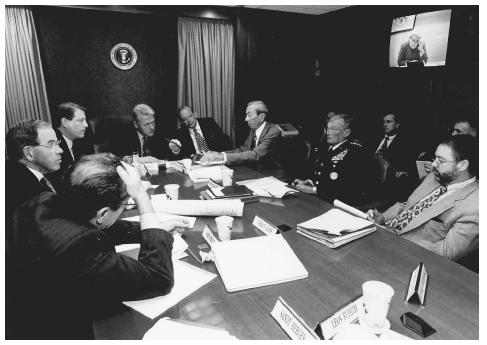Clinton Administration (1993–2001), United States National Security Policy
█ CARYN E. NEUMANN
President William Jefferson (Bill) Clinton argued that the end of the Cold War did not mean that the United States could abandon its long-standing aim of ensuring national security by promoting democratization around the world. Now the sole surviving superpower, the U.S. in the 1990s would continue to assertively support democracy but not in a manner that might place American troops in great jeopardy. Fearful of becoming stuck in a Vietnam-like quagmire, the Clinton administration would employ force as a tool of coercive diplomacy and punishment but avoid full-scale conflict. The national security system, re-designed by the new president, would also de-emphasize military issues in favor of a greater emphasis upon economics in the formulation of policy.
President Clinton entered the White House in 1993 with little experience or enthusiasm for international affairs. The first president to take office after the end of the Cold War, President Clinton was also the first to come of

age during the Vietnam War and he saw national security through the prism of that conflict. Vietnam shaped the Clinton administration in two ways: it made the president reluctant to commit troops to combat and it damaged his standing with the military because he had not served in the military during the conflict. The relative worldwide calm after the dissolution of the Warsaw Pact and the American triumph in the Persian Gulf War made the marginalization of overseas issues politically possible.
As his first national security measure, Clinton issued a presidential directive to revise and rename the framework governing the work of the National Security Council. The previous Bush administration's National Security Review (NSR) and National Security Directive (NSD) series were abolished in favor of a Presidential Review Directive (PRD). The administration would use PRD to re-evaluate security classifications and the safeguarding of systems to ensure that they were in line with the reality of the current dangers instead of the threat potential that had existed during the Cold War.
The second presidential directive (PRD-2) established a new NSC structure, with a broader emphasis on economic issues than in previous administrations. PRD-2 also established three levels of deliberative committees under the NSC: a principals committee of main NSC meetings, a deputies committee including deputy chiefs of key agencies, and working groups on a variety of issues. Warren Christopher served as Secretary of State, with Anthony Lake heading the NSC until his replacement by his deputy Samuel R. "Sandy" Berger in 1997.
The Clinton administration argued that the end of the Cold War permitted the U.S. to shift to a foreign policy that rested on support for such values as democracy, market economics, humanitarian relief, and genocide suppression. PRD-20 had recommended this overhaul of U.S. policies after concluding that foreign aid programs were often wasteful, incoherent, and inconsistent with U.S. objectives. The most urgent issues that the NSC dealt with in the first years of the Clinton administration were Bosnia (genocide suppression), Haiti (democracy and humanitarian relief), Iraq (strategic arms control), and Somalia (humanitarian relief). Most of the PRDs remain classified, but it is known that the NSC system also dealt with illegal drugs, United Nations peacekeeping, and global environmental affairs.
As Clinton settled into the presidency, he experienced increasing conflict with Congress and a public angered by his policies. A 1993 PRD to permit U.S. forces to operate under the control of a United Nations commander particularly enraged many conservatives and had to be abandoned. The administration responded to its critics by making overseas actions more modest in scope. In Clinton's second term, the administration sought to integrate Eastern and Western Europe without provoking tensions with Russia; to promote more open trade; to improve defenses against such transnational threats as terrorism and narcotics; and to encourage a strong and stable Asian-Pacific community by seeking trade cooperation with China while avoiding confrontation with it on human rights issues.
Critics of administration argue that it appeared to lack a clear consensus on what constituted vital national interests. The obvious reluctance of the president to risk significant numbers of troops to achieve declared political objectives prompted U.S. allies to express concern about reduced American global military involvement and may have encouraged continued troubles with "rogue" nations such as Iraq.
█ FURTHER READING:
BOOKS:
Drew, Elizabeth. On the Edge: The Clinton Presidency. New York: Simon & Schuster, 1994.
Herrnson, Paul S., and Dilys M. Hill, eds. The Clinton Presidency: The First Term, 1992–96 New York: St. Martin's Press, 1999.
ELECTRONIC:
Digital National Security Archive. "Presidential Directives on National Security from Truman to Clinton." 2003. < http://nsarchive.chadwyck.com/pdessayx.htm >(April 25, 2003).
White House. "History of the National Security Council, 1947–1997." < http://www.whitehouse.gov/nsc/history.html >(April 25, 2003).
SEE ALSO
Cold War (1972–1989): The Collapse of the Soviet Union
Executive Orders and Presidential Directives
Iraq War: Prelude to War (The International Debate Over the Use and
Effectiveness of Weapons Inspections)
Iraqi Freedom, Operation (2003 War Against Iraq)
National Security Advisor, United States
National Security Strategy, United States
NATO (North Atlantic Treaty Organization)
NSC (National Security Council)
NSC (National Security Council), History
Comment about this article, ask questions, or add new information about this topic: